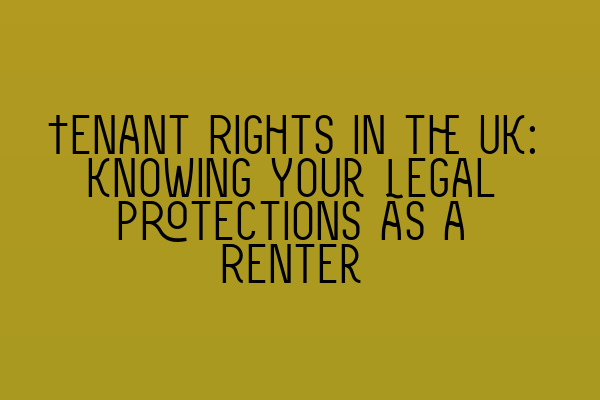Tenant Rights in the UK: Knowing Your Legal Protections as a Renter
As a tenant in the UK, it is important to know and understand your legal rights and protections. Being informed about your rights can help prevent disputes with landlords, ensure fair treatment, and provide peace of mind during your tenancy. In this blog post, we will discuss the key tenant rights in the UK and provide you with the information you need to navigate the rental process confidently.
1. Right to a Written Agreement:
When renting a property in the UK, you have the right to a written tenancy agreement. This agreement should clearly outline the terms and conditions of your tenancy, such as the duration of the tenancy, the amount of rent, and any other important clauses or provisions. It is important to thoroughly read and understand the agreement before signing it to avoid any misunderstandings or disputes in the future.
2. Right to a Deposit Protection Scheme:
When you pay a security deposit for your rental property, your landlord is required by law to protect and safeguard it in a government-approved tenancy deposit protection scheme. This scheme ensures that your deposit is held securely and that you can get it back at the end of your tenancy, provided you have met the terms of the agreement.
3. Right to Live in a Safe and Habitable Property:
As a tenant, you have the right to live in a safe and habitable property. Your landlord is responsible for ensuring that the property meets certain health and safety standards, such as having functioning heating and hot water, adequate ventilation, and proper electrical wiring. If you encounter any issues with the condition of your rental property, you should notify your landlord in writing and give them a reasonable opportunity to resolve the problems.
4. Right to Privacy:
Your landlord must respect your right to privacy as a tenant. They should not enter your property without giving you proper notice, except in cases of emergency. Generally, your landlord should give you at least 24 hours’ notice before entering your property for inspections, repairs, or other non-emergency reasons. If your landlord repeatedly violates your privacy rights, you should seek legal advice and consider taking appropriate action.
5. Right to Seek Repairs:
If there are repairs or maintenance issues in your rental property that are the responsibility of your landlord, you have the right to request and expect prompt action to resolve them. It is advisable to report any repair issues in writing and keep a record of all communications with your landlord. If your landlord fails to address the repairs within a reasonable time frame, you may be eligible to take legal action or seek assistance from your local authority.
6. Right to Protection from Unfair Eviction:
In the UK, landlords must follow specific procedures when evicting tenants. They cannot evict you without a valid reason or without providing proper notice. There are two main types of tenancy agreements in the UK: fixed-term and periodic. Depending on the type of agreement you have, different eviction processes apply. It is crucial to familiarize yourself with the eviction process and seek legal advice if you believe you are being unfairly evicted.
7. Right to Challenging Rent Increases:
While landlords have the right to increase the rent, they must follow certain rules and procedures. In most cases, your landlord can only increase the rent if you agree to the proposed increase or if it is specified in your tenancy agreement. If you believe that a rent increase is unreasonable, you have the right to challenge it by negotiating with your landlord or seeking assistance from a relevant authority.
8. Right to a Fair Tenancy Termination:
As a tenant, you have the right to fair notice when your tenancy is coming to an end. Your landlord must provide you with sufficient notice before asking you to vacate the property. The length of notice will depend on the type of tenancy agreement and its terms. Understanding your rights regarding tenancy termination can help you plan your move and avoid any unnecessary complications.
Conclusion:
Being aware of your rights as a tenant in the UK is essential for a positive rental experience. By understanding your legal protections, you can confidently negotiate your tenancy and address any issues that may arise during the course of your rental. If you have further questions or need assistance with tenant rights, it is advisable to consult with a solicitor specializing in property law.
For more information on SQE exams and preparation, you may find the following related articles helpful:
– SQE 1 Practice Exam Questions
– SQE 1 Practice Mocks FLK1 FLK2
– SQE 2 Preparation Courses
– SQE 1 Preparation Courses
– SRA SQE Exam Dates
Remember, knowledge is power, and staying informed about your rights as a tenant can help ensure a positive and respectful rental experience.
